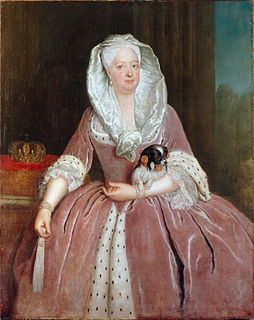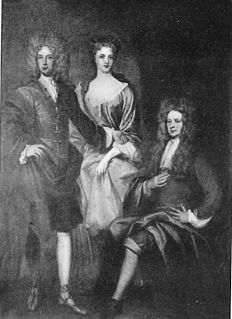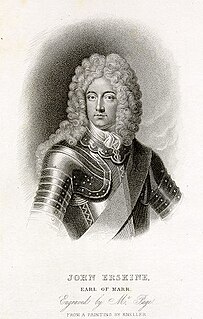Tune

| "Cam Ye O'er Frae France?" | |
|---|---|
| Song | |
| Language | Scots |
| English title | Came You Over From France? |
| Written | 1700s |
| Songwriter(s) | Traditional |
Cam ye o'er frae France? is a Scots folk song from the time of the Jacobite rebellions of the 18th century. It satirises the marital problems of the Hanoverian George I. [1]
After the death of Queen Anne the British crown passed on to George, the Elector of Hanover. In his entourage George I brought with him a number of German courtiers, including his mistress Melusine von der Schulenburg, whom he later created the Duchess of Kendal (known as the Goose) and his half-sister Sophia von Kielmansegg (commonly referred to as the Sow). George I's wife Sophia Dorothea of Celle remained in Hanover, imprisoned at Ahlden House after her affair with Philip Christoph von Königsmarck – the blade in the song. Another historic personality in the song is John Erskine, Earl of Mar (Bobbing John) who recruited in the Scottish Highlands for the Jacobite cause. The nickname Geordie Whelps is a reference to the House of Welf, the original line of the House of Hanover. [2]

Cam ye o'er frae [lower-alpha 1] France? Cam ye down by Lunnon? [lower-alpha 2]
Saw ye Geordie Whelps [lower-alpha 3] and his bonny woman?
Were ye at the place called the Kittle Housie? [lower-alpha 4]
Saw ye Geordie's grace riding on a goosie? [lower-alpha 5]
Geordie, he's a man there is little doubt o't; [lower-alpha 6]
He's done a' he can, wha can do without it?
Down there came a blade linkin' like my lordie;
He wad drive a trade at the loom o' Geordie.
Though the claith were bad, blythly may we niffer;
Gin we get a wab, it makes little differ.
We hae tint our plaid, bannet, belt and swordie,
Ha's and mailins braid—but we hae a Geordie!
Jocky's gane to France and Montgomery's lady;
There they'll learn to dance: Madam, are ye ready?
They'll be back belyve belted, brisk and lordly;
Brawly may they thrive to dance a jig wi' Geordie!
Hey for Sandy Don! Hey for Cockolorum!
Hey for Bobbing John and his Highland Quorum!
Mony a sword and lance swings at Highland hurdie;
How they'll skip and dance o'er the bum o' Geordie!
(Repeat first verse)
a, a' = adj all [5]
bannet = n bonnet [5]
belive (belyve) = quickly, soon, immediately [4]
blade = a person of weak, soft constitution from rapid overgrowth; Count Philip Christoph von Königsmarck of Sweden [4]
blithe = adj festive; glad; happy; joyful. n gladly, happily. [5]
Bobbing John = John Erskine, Earl of Mar. [4] So called because he switched sides 6 times before his death. [4]
braid = broad
braw = adj fine; handsome; splendid; admirable; well-dressed; worthy [5]
brawly = well [3]
ca = v call [5]
claith = cloth
cloth = George Augustus [4]
cockalorum = a young cock, or little man with a high opinion of himself. [4] Alexander Gordon, Marquis of Huntly [4]
differ = n difference; dissent. v dissent. [5]
Don = diminutive of Gordon (the last syllable). [4]
drive a trade = metaphor for fornication - Count Philip Christoph von Königsmarck of Sweden's alleged affair with Princess Sophia Dorothea of Celle
gane = gone
gin = by the time, if, whether
goosie = Jacobite nickname for Melusine von der Schulenburg, Duchess of Kendal, mistress of King George I
ha = n hall; house; mansion. [5]
ha's and mailins = houses and farmlands
hae = v have; take; credit (believe/think) [5]
Highland hurdie = a Highland soldier [4]
Highland quorum = either the hunting party on 27 August 1715 or the planning meeting on 3 September 1715 [4]
hurdie = buttock
Jocky = a Scotsman. [4] James III [4]
link = n skip; v walk smartly; [5] to make love [4]
linkin = tripping along
loom = a loom; a metaphor for female sexual organs [4]
loom of Geordie = George I's former wife, Princess Sophia Dorothea of Celle [4]
lordie = George I [4]
mailing = a leased smallholding, a farm [4]
mailings braid = broad farmlands [4]
Montgomery = Sidney, Earl of Godolphin [4]
Montgomery's lady = Queen Mary Beatrice of Modena, wife of James II and mother of James III [4]
mony = adj many [5]
niffer = haggle or exchange; [3] to exchange, to barter with objects hidden in the fists [4]
o'er = over; excessively; too [5]
plaid = James III [4]
Sandy = diminutive of Alexander. [4]
Sandy Don = Major-General Alexander Gordon of Auchintoul [4]
thrive = success [5]
tint = lost; [3] lost (past participle of tine = to lose) [4]
to dance = to raise funds, to raise troops and prepare to fight. Compare the song To Auchindown, which has the lines: "We joined the dance, and kissed the lance, / And swore us foes to strangers." [4]
to dance a jig with Geordie = To fight with George I. [4]
wab = web (or length) of cloth); [3] a length of woven cloth from one loom [4]
wad = n pledge, security; wager, bet; forfeit. adj wedded. v pledge; wager, bet; wed. [5]
wha = pron who [5]
[3]

George II was King of Great Britain and Ireland, Duke of Brunswick-Lüneburg (Hanover) and a prince-elector of the Holy Roman Empire from 11 June 1727 (O.S.) until his death in 1760.

George I was King of Great Britain and Ireland from 1 August 1714 and ruler of the Duchy and Electorate of Brunswick-Lüneburg (Hanover) within the Holy Roman Empire from 23 January 1698 until his death in 1727. He was the first British monarch of the House of Hanover.

Geordie is a nickname for a person from the Tyneside area of North East England, and the dialect used by its inhabitants, also known in linguistics as Tyneside English or Newcastle English. There are different definitions of what constitutes a Geordie. The term is used and has been historically used to refer to the people of the North East. A Geordie can also specifically be a native of Tyneside and the surrounding areas. Not everyone from the North East of England identifies as a Geordie.
Jacobite Relics is a two volume collection of songs related to the Jacobite risings, compiled by the Scottish poet and novelist James Hogg on commission from the Highland Society of London in 1817. Most of the songs in the collection are Jacobite, and a minority are Whig. A number of the songs were written or adapted by Robert Burns and scholars speculate as to how many of them were authored or at least substantially altered by Hogg himself.

Ehrengard Melusine von der Schulenburg, Duchess of Kendal, Duchess of Munster was a longtime mistress to King George I of Great Britain.

Sophia Dorothea of Hanover was Queen in Prussia and Electress of Brandenburg during the reign of her husband, King Frederick William I, from 25 February 1713 to 31 May 1740. She was the daughter of King George I of Great Britain and his wife Sophia Dorothea of Celle, the sister of King George II of Great Britain, and the mother of Frederick the Great.
"Highland Laddie", also known as "Hielan' Laddie", is the name of a Scottish popular folk tune "If Thou'lt Play Me Fair Play", but as with many old melodies various sets of words can be sung to it, of which Robert Burns's poem "Highland Laddie" is probably the best known. "If Thou'lt Play Me Fair Play" has been reworked several times since Burns set down his words, Donkey Riding being one variant.

General Alexander Gordon, 2nd Duke of Gordon, styled Earl of Enzie until 1684 and the Marquess of Huntly from 1684 to 1716, was a Scottish peer.

Sophia Dorothea of Brunswick-Lüneburg-Celle was the repudiated wife of future King George I of Great Britain. The union with her first cousin was a marriage of state, arranged by her father George William, her father-in-law the Elector of Hanover, and her mother-in-law, Electress Sophia of Hanover, first cousin of King Charles II of England. She is best remembered for her alleged affair with Count Philip Christoph von Königsmarck that led to her being imprisoned in the Castle of Ahlden for the last thirty years of her life.

John Erskine, 23rd and 6th Earl of Mar, KT, was a Scottish Jacobite who was the eldest son of Charles, 22nd and 5th Earl of Mar, from whom he inherited estates that were heavily loaded with debt. He was the 23rd Earl of Mar in the first creation of the earldom. He was also the sixth earl in the seventh creation. He was nicknamed Bobbing John, for his tendency to shift back and forth from faction to faction, whether from Tory to Whig or Hanoverian to Jacobite. Deprived of office by the new king in 1714, Mar raised the standard of rebellion against the Hanoverians; at the battle of Sheriffmuir in November 1715, Mar's forces outnumbered those of his opponent, but victory eluded him. At Fetteresso his cause was lost, and Mar fled to France, where he would spend the remainder of his life. The parliament passed a Writ of Attainder against Mar, for treason, in 1716 as punishment for his disloyalty, which was not lifted until 1824. He died in 1732.

Lord George Murray (1694-1760), sixth son of John Murray, 1st Duke of Atholl, was a Scottish nobleman and soldier who took part in the Jacobite rebellions of 1715, 1719, and played a senior role in that of 1745.

Tonight's the Night...Live is the second live album by British folk rock band Steeleye Span.

Saraband for Dead Lovers is a 1948 British historical drama film directed by Basil Dearden and starring Stewart Granger and Joan Greenwood. It is based on the 1935 novel by Helen Simpson. Set in seventeenth-century Hanover, it depicts the doomed romance between Philip Christoph von Königsmarck and Sophia Dorothea of Celle, the wife of the Elector of Hanover. The saraband mentioned in the title is a type of Spanish dance.

Parcel of Rogues is an album by British folk rock band Steeleye Span. It was their most successful album thus far, breaking into the Top 30.

Countess Maria Aurora von Königsmarck was a Swedish and German noblewoman of Brandenburg extraction and mistress of Augustus the Strong, Elector of Saxony and King of Poland.
"Swalwell Hopping" is a Geordie folk song written in the 19th century by John Selkirk, in a style deriving from music hall.
The Newcassel Worthies is a famous Geordie folk song written in the 19th century by William "Willie" Armstrong, in a style deriving from music hall.
"Wha'll be King but Charlie?" also known as The News from Moidart, is a song about Bonnie Prince Charlie, sung to the tune of 'Tidy Woman', a traditional Irish jig the date of which is unclear but the tune was well known by 1745. The lyrics were written by Caroline Nairne. Because Nairne published anonymously, the authorship of this and her other poems and lyrics was once unclear, however, late in her life Nairne identified herself and modern scholars accept that these lyrics are hers. Carolina, Baroness Nairne was a Jacobite from a Jacobite family living at a time when the last remnants of political Jacobitism were fading as Scotland entered a period of Romantic nationalism and literary romanticism. Bonnie Prince Charlie stayed in the house where Caroline Nairne was born and reared when fleeing British capture after losing the Battle of Culloden.
Alexander Gordon of Auchintoul was a Scottish general who fought in the Russian army under Peter the Great in 1696–1711, and for the Jacobites in the Jacobite rising of 1715.
Geordie is a masculine given name and nickname which may refer to: